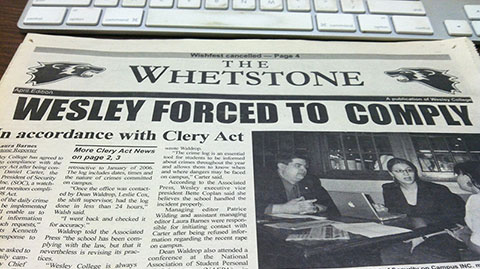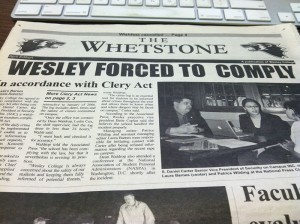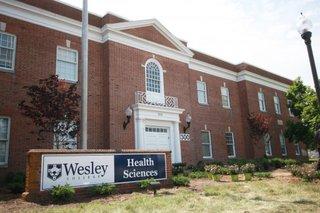By Tristin Burris (Whetstone Staff)
The woman was contacted by her attacker the day after it happened.
Through a series of instant messages, she relived the fear, pain, and anger. The man admitted he had forced himself on her. But she did not see any justice – from both Wesley College and the Dover police – until three days later.
Although it happened seven years ago, repercussions of rape – for the victim, the perpetrator and the college that tried to ignore it – do not just disappear.
In January, Wesley College had to pay $45,000 for the mishandling of a 2006 rape case. After a 19-year-old woman was reportedly raped in her Carpenter Hall dorm room, Wesley College violated the Clery Act because the college’s administration failed to properly issue a timely warning; failed to make the crime log open to public inspection; and failed to properly include required policy statements in the Campus Security Reports.
Interim Chief Financial Officer Alan Russell said the fine was paid through funds from the college’s general operating account.
“The payment will not affect tuition or fees charged to students, nor will it affect faculty or staff,†he said.
According to the U.S. Department of Education, on Feb. 12, 2006, Wesley College student Edward Robinson assaulted another Wesley student in the early morning hours. They were watching television in her dorm room, when Robinson forced himself on her, the report states. The victim reported the incident later that day. Wesley security officials immediately determined the attack to be sexual assault; however, the college neglected to issue a warning out to the campus.
“I think there should have been a public notice sent out to everyone to warn them, because now we get them all the time,†said Aaron Givens, senior resident assistant to Zimmerman Hall.
The Dean of Students at the time, Dr. Kenneth Waldrop, waited for three days after the rape to interview Robinson and determine if he was considered “still a threat.â€
“The law requires the school to make a report if there is a perceived ongoing threat,†Waldrop told The Whetstone at the time. “In the opinion of everyone involved in this particular case, there was no continuing threat to students.â€
Waldrop and the administration suggested that since this was an “acquaintance rape,†there was no persistent threat to other students.
Kaylee Miller, a sophomore Gooding Hall resident assistant, believes students should be careful who they let into their rooms, even if they are acquaintances.
“I personally have never felt threatened, but being in an all-female building, I feel like we have a bigger risk,†she said. “I feel as though the school works well as a unit to protect against people outside of the school, but it’s the people who attend Wesley and have the access, because people recognize their face and don’t see them as a threat.â€
According to college study used by the U.S. Department of Education in its review of the Wesley case, statistics showed that it was not fitting for an institution to declare a person “no longer a threat†merely because that person was an acquaintance. The study’s data showed that most acquaintance rape goes undetected because it is often not reported. The study targeted “undetected rapists†and found that a majority of these were, in fact, repeat offenders.
“Almost two-thirds of these rapists were repeat offenders who averaged close to six rapes each,†the study said.
Robinson was free for three days before he was arrested by the Dover Police Department.
Tori Iles, a freshman Gooding Hall resident, was concerned after hearing that Robinson was unattended for several days after the rape.
“The guy should have never walked away scot-free,†she said.
Wesley officials also violated its responsibility to a reporter for The Whetstone when security officers denied her access to log reports containing information about the rape, the DOE said. The administration wrongly claimed that Family Educational Rights and Privacy Act (FERPA) protected them from releasing these records.
Each fine assessed for the college’s errors could have been as high as $27,500. Wesley College received two of these top amounts: failure to issue a timely warning; and failure to include required policy statements in its Annual Security Report. The third fine was for $5,000, for failure to keep a public crime log.
These original charges totaled $60,000, but after advice given to the school by an attorney experienced in Clery Act matters, Wesley was able to receive the reduced settlement of $45,000.
This incident occurred under President Scott D. Miller. President William Johnston and other new administrators, including Director of Safety and Security Walt Beaupre, have since taken over.
“Safety-related precautions and communication to students, faculty and staff have been totally revamped since the incident in 2006,†President Johnston said. “Mr. Beaupre, who arrived at Wesley after the 2006 incident, is doing an outstanding job in assisting Wesley in strengthening safety on campus as well as helping the college comply with the intent of the Clery Act. “
This current administration was faced with a similar situation in 2010, but handled it appropriately and legally, Beaupre said.
“In 2010, we reported one sexual assault in a residence hall,†Beaupre said. “The student responsible for committing the alleged sexual assault in 2010 was identified and removed from campus within 15 minutes of the victim reporting the incident.â€
Since then, Wesley College has provided additional instruction to its security officers on the Clery Act requirements, and the current administration has agreed to continue to take appropriate action to fully comply with the Clery Act and to ensure that all future crime log reports are accurate and complete.






